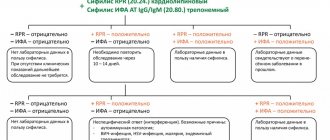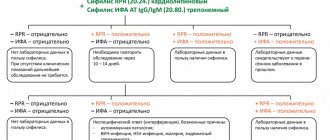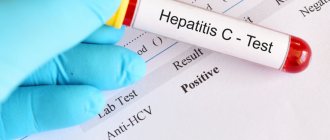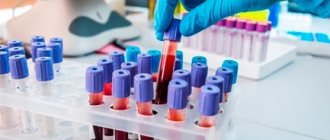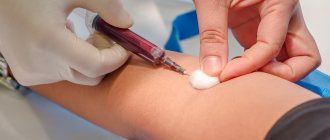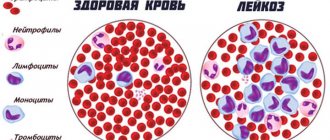Most screening methods involve various blood tests. They are intended for mass examination of people in order to identify dangerous diseases. The technique for performing them (analysis from a vein or finger) and the price of the reagents are so simple and affordable that every state medical institution examines its patients for free. But recently, conflicting data have emerged regarding the blood test for RW. According to them, this research is not always as informative as previously thought.
Complexes with this research
Male infertility.
Extended examination Analysis of the state of male reproductive health 29,360 ₽ Composition Pregnancy planning. Diagnosis of infections 14 tests for expectant mothers 8,800 ₽ Composition
Expanded hospital complex Expanded infectious screening for prevention and hospitalization 7,890 ₽ Composition
IN OTHER COMPLEXES
- Women's check-up No. 1 RUB 19,720
- Eight infections. Complex for women 5,370 ₽
- Men's check-up No. 1 RUB 18,920
- Eight infections. Complex for men 5,370 ₽
- Hospital complex RUB 2,140
Data decryption
Before taking a test for rheumatoid factor, patients must adhere to several rules: donate blood on an empty stomach, do not drink alcohol and do not smoke. It is important to follow all of these instructions to avoid false positive results.
Normally, the activity of rheumatoid factor in the blood should be within 14 IU/ml (or 10 U/ml). This figure is the same for men and women.
Rheumatoid factor may be elevated and normal in the following situations:
- Old age of the patient;
- Taking medications immediately before the test;
- Condition after vaccination.
However, if the doctor has ruled out these conditions, then elevated test results may indicate the presence of:
- Rheumatoid arthritis (with very high titers);
- Sjögren's syndrome;
- Mixed cryoglobulinemia (vasculitis);
- Connective tissue diseases;
- Systemic lupus erythematosus;
- Scleroderma;
- Systemic vasculitis;
- Juvenile arthritis (develops at a young age);
- Hypersensitizing vasculitis;
- Polymyositis;
- Diseases of an infectious nature (bacterial endocarditis, tuberculosis, parasitic infections, salmonellosis, brucellosis, syphilis, influenza, chronic hepatitis, mumps, rubella and others);
- Various diseases of the pulmonary system (silicosis, sarcoidosis, asbestosis, interstitial fibrosis);
- Cirrhosis of the liver;
- The presence of malignant neoplasms (colon cancer, leukemia).
An increase in rheumatoid factor is assessed according to the following criteria:
- A slightly elevated result is considered to be 15-30 IU/ml;
- 30-60 IU/ml - increased result;
- More than 60 IU/ml is a significant increase in rheumatoid factor.
It should be noted that the rheumatologist may send the patient for re-testing or for additional other research methods if the rheumatoid factor level is low. This circumstance only indicates that the very presence of this factor in the blood is an indicator of the presence of various diseases in the body.
Detailed description of the study
Syphilis is an infectious disease caused by Treponema pallidum. Transmission of infection occurs primarily through sexual contact without the use of barrier contraception. However, it is possible to become infected with treponema pallidum through contact and household contact if personal hygiene rules are not observed, as well as transmission of the pathogen from mother to child during childbirth or breastfeeding. Syphilis can affect any organs and systems. In the absence of timely treatment, the disease becomes chronic. Initially, a hard chancre is formed at the site of contact with the source of infection - a painless ulcer with a small amount of transparent content on the surface. Often the body reacts to the introduction of the pathogen by inflammation of the lymph nodes located near the site of the lesion. Within a few weeks, a scar forms in place of the chancre. However, the disease does not recede, and after some time the infected person notices the appearance of a specific rash on the body - the appearance of small, bright pink spots (rosacea rash). This stage is called secondary syphilis. The disease is prone to periodic exacerbations with changes in the nature of the rash. Tertiary syphilis is the result of untimely diagnosis and treatment of this disease. Along with the formation of nodes and tubercles on the skin, which are called gummas, prone to ulceration and scarring, damage to internal organs is observed. Diagnosis and treatment of syphilis is carried out by a dermatovenerologist. One of the most important diagnostic studies is the detection of immunoglobulins M and G for Treponema pallidum in the blood. This test is the primary screening test for detecting syphilis. If a positive result is obtained, further diagnostics are necessary to determine disease activity.
How is it done and what kind of blood is needed for analysis?
The material for analysis can be any blood, either from a vein or from a finger. The specificity and reliability of the analysis depends on many factors. It is important to consider that this is a nonspecific test that has a large number of false positive and false negative results. Therefore, it cannot be relied upon with complete confidence in any case. This is due to the fact that blood from a finger can only be examined using the microprecipitation reaction
It allows you to quickly determine the presence of antibodies in the body. But their specificity cannot be determined. Such antibodies can be any proteins formed in large quantities during any infectious processes, immediate or delayed allergic reactions. This means that the true disease can masquerade as a false positive RW and be mistaken for syphilis. On the other hand, venous blood from a finger is not able to detect small concentrations of specific antibodies to the causative agent of syphilis in the initial stages of the disease or during its sluggish course. This causes a false negative result.
Important to remember! The diagnostic value of a finger prick blood test for RW is so low that it makes this method of conducting it impractical in medical practice. More reliable results can only be obtained by examining venous blood. Unlike finger prick analysis, which makes it possible to examine only a small amount of whole capillary blood, plasma can be obtained from venous blood, which contains all the antibodies circulating in the body!
Do not forget about the correctness of the research. It is best to donate blood in the morning or at least on an empty stomach. The day before, strong physical and psycho-emotional stress is excluded. It is advisable to minimize the administration of drugs that affect the activity of the immune response and cause an allergic reaction.
Why is a polymerase reaction a chain reaction?
PCR is a method for detecting DNA. It allows you to take one or more molecules of deoxyribonucleic acid and quickly multiply them. As a result, a sufficiently large amount of genetic material is obtained that is available for research.
The reaction is carried out in a special apparatus - an amplifier. First, the sample being tested is heated so that the DNA (which is normally a double-stranded helix) denatures and breaks down into two separate strands. Then a special enzyme, polymerase, completes the second one on each of the two chains, resulting in two DNA molecules. Next, a similar procedure is repeated with each of them. With each repetition, the number of DNA increases exponentially, doubling.
Armed with a calculator, you can calculate that after 30–40 repetitions of the reaction (and this is the number that is the standard during research), more than a billion copies of DNA will be obtained. The molecules obtained at each stage are immediately used as templates for the synthesis of new copies - and therefore the reaction is called a chain reaction.
What infections can be diagnosed using PCR?
PCR helps diagnose infections of the male and female genitourinary system: ureaplasmosis, chlamydia, herpes, gonorrhea, mycoplasmosis, gardnerellosis, human papillomavirus infection. In gastroenterology, the method is used to identify the causative agent of peptic ulcer H. pylori, in pulmonology - for the diagnosis of tuberculosis, pneumonia caused by bacteria and viruses.
PCR helps to detect pathogens of diphtheria, intestinal infections (salmonellosis), viral hepatitis (B, C, G), oncoviruses, cytomegaloviruses.
Cost of PCR analysis
| Name of service | price, rub. |
| PCR-6 (Ureaplasma species, Chlamydia trachomatis, Mycoplasma genitalium, Mycoplasma hominis, Trichomonas vaginalis, Gardnerella vaginalis) | 1345 |
| PCR-9 (Cytomegalovirus, Herpes Simplex Virus 1/2, Chlamydia trachomatis, Mycoplasma genitalium, Mycoplasma hominis, Ureaplasma parvum, Ureaplasma urealyticum, Candida albicans, Gardnerella vaginalis) | 2100 |
| PCR-10 (Cytomegalovirus, Herpes Simplex Virus 1/2, Chlamydia trachomatis, Mycoplasma genitalium, Mycoplasma hominis, Ureaplasma parvum, Ureaplasma urealyticum, Candida albicans, Gardnerella vaginalis, Human Papillomavirus of high carcinogenic risk) | 2975 |
| PCR-12 | 3425 |
| PCR-13 | 3690 |
In our clinic, PCR tests can be done quickly, without waiting in line. The analysis is carried out on modern equipment. Sign up by phone +7 (495) 120-08-07.
What to do if RW is positive
If the obtained data show ++++ or ++, a secondary blood sampling is necessary. Sometimes ORS (disease selection response) is used. To do this, blood serum is applied to a glass slide and a cardiolipid antigen is added. If the repeated result is positive, a visit to a venereologist is required to make an accurate diagnosis.
To prevent congenital syphilis in children, pregnant women donate blood for RW during all nine months: this test is one of the mandatory procedures for expectant mothers. If a pregnant woman becomes infected, comprehensive treatment is necessary during the first months. If treatment is neglected, the consequences are dangerous for both the mother and the unborn child.
Indications for analysis
Medical workers, employees of cosmetology and dermatology offices, and food workers are required to donate blood for RV. Other indications for a specific test are:
- pregnancy planning;
- preparation for operations;
- unprotected sex (especially with a new partner);
- suspicion of sexually transmitted infections;
- blood or sperm donation;
- the appearance of an incomprehensible rash on the mucous membranes and skin, discharge from the genitals, disruption of the menstrual cycle in women;
- visible enlargement of lymph nodes (especially in the groin area).
What are PCR tests used for in medicine?
Compared to other laboratory diagnostic methods, PCR has some advantages:
- High sensitivity. The method will work if at least a few DNA molecules are present in the material. You can examine not only biological fluids (blood, urine) and body tissues, but also water and soil.
- High specificity. The method can with one hundred percent probability indicate a specific pathogen, because the entire billion DNA obtained are exact copies of the very first one that was originally present in the material.
- Versatility. In order to carry out PCR, you can take any material, as long as it contains DNA. You can study the genes of people, any microbes, animals, plants. It is possible to study different types of DNA in the same material.
Diagnosis of infections is just one area of application of polymerase chain reaction. PCR is used to study new genes, establish paternity, and detect hereditary diseases.
